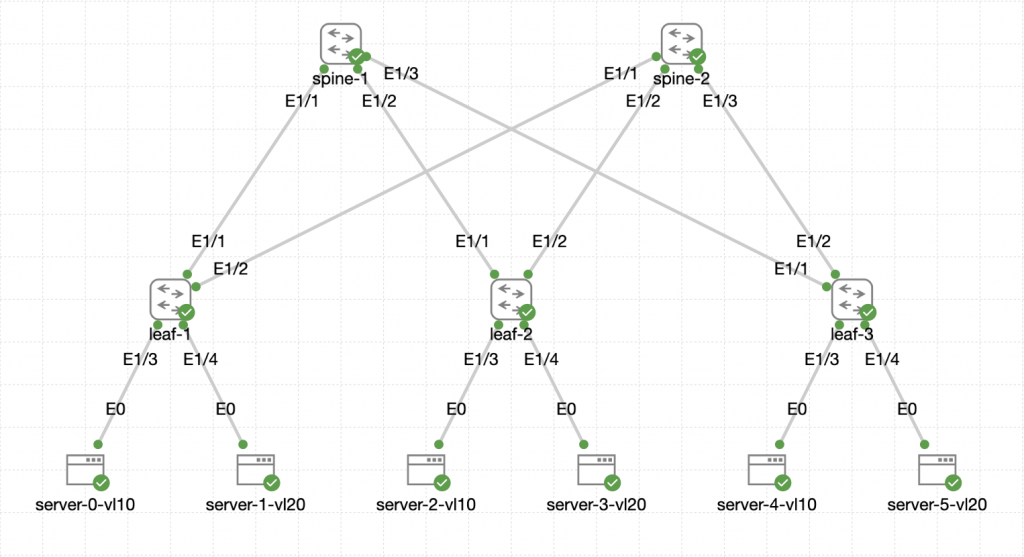In this part we are going to look at the EVPN overlay setup of the topology. This allows the sharing of the layer 2 information learnt at each leaf switch. For this, we will use BGP.
Lets remind ourselves of the topology:

The BGP setup will have the spines as Route Reflectors to the topology so that we achieve a level of redundancy and all peerings will be iBGP. Two address families will be used for the exchange of NLRI, a standard IPv4 Unicast peering and then L2VPN EVPN.
First, we need to set the overlay to EVPN on all switches in the topology:
nv overlay evpnBGP Configuration
The BGP configuration for the spines is:
router bgp 64500
log-neighbor-changes
address-family ipv4 unicast
address-family l2vpn evpn
retain route-target all
template peer LEAF
remote-as 64500
update-source loopback0
address-family ipv4 unicast
send-community extended
route-reflector-client
soft-reconfiguration inbound
address-family l2vpn evpn
send-community
send-community extended
route-reflector-client
neighbor 10.0.0.3
inherit peer LEAF
neighbor 10.0.0.4
inherit peer LEAF
neighbor 10.0.0.5
inherit peer LEAFAnd the configuration for the leaves:
router bgp 64500
log-neighbor-changes
address-family ipv4 unicast
address-family l2vpn evpn
template peer SPINE
remote-as 64500
update-source loopback0
address-family ipv4 unicast
send-community extended
soft-reconfiguration inbound
address-family l2vpn evpn
send-community
send-community extended
neighbor 10.0.0.1
inherit peer SPINE
neighbor 10.0.0.2
inherit peer SPINEWe can verify the configuration on the spines by checking the neighbour states:
spine-1(config)# show bgp ipv4 unicast summary
BGP summary information for VRF default, address family IPv4 Unicast
BGP router identifier 10.0.0.1, local AS number 64500
BGP table version is 4, IPv4 Unicast config peers 3, capable peers 3
0 network entries and 0 paths using 0 bytes of memory
BGP attribute entries [0/0], BGP AS path entries [0/0]
BGP community entries [0/0], BGP clusterlist entries [0/0]
Neighbor V AS MsgRcvd MsgSent TblVer InQ OutQ Up/Down State/PfxRcd
10.0.0.3 4 64500 10 10 4 0 0 00:01:13 0
10.0.0.4 4 64500 10 10 4 0 0 00:01:10 0
10.0.0.5 4 64500 10 10 4 0 0 00:01:06 0
spine-1(config)# show bgp l2vpn evpn summary
BGP summary information for VRF default, address family L2VPN EVPN
BGP router identifier 10.0.0.1, local AS number 64500
BGP table version is 5, L2VPN EVPN config peers 3, capable peers 3
0 network entries and 0 paths using 0 bytes of memory
BGP attribute entries [0/0], BGP AS path entries [0/0]
BGP community entries [0/0], BGP clusterlist entries [0/0]
Neighbor V AS MsgRcvd MsgSent TblVer InQ OutQ Up/Down State/PfxRcd
10.0.0.3 4 64500 10 10 5 0 0 00:01:25 0
10.0.0.4 4 64500 10 10 5 0 0 00:01:21 0
10.0.0.5 4 64500 10 10 5 0 0 00:01:17 0 spine-2(config)# show bgp ipv4 unicast summary
BGP summary information for VRF default, address family IPv4 Unicast
BGP router identifier 10.0.0.2, local AS number 64500
BGP table version is 4, IPv4 Unicast config peers 3, capable peers 3
0 network entries and 0 paths using 0 bytes of memory
BGP attribute entries [0/0], BGP AS path entries [0/0]
BGP community entries [0/0], BGP clusterlist entries [0/0]
Neighbor V AS MsgRcvd MsgSent TblVer InQ OutQ Up/Down State/PfxRcd
10.0.0.3 4 64500 10 10 4 0 0 00:01:43 0
10.0.0.4 4 64500 10 11 4 0 0 00:01:42 0
10.0.0.5 4 64500 10 10 4 0 0 00:01:37 0
spine-2(config)# show bgp l2vpn evpn summary
BGP summary information for VRF default, address family L2VPN EVPN
BGP router identifier 10.0.0.2, local AS number 64500
BGP table version is 5, L2VPN EVPN config peers 3, capable peers 3
0 network entries and 0 paths using 0 bytes of memory
BGP attribute entries [0/0], BGP AS path entries [0/0]
BGP community entries [0/0], BGP clusterlist entries [0/0]
Neighbor V AS MsgRcvd MsgSent TblVer InQ OutQ Up/Down State/PfxRcd
10.0.0.3 4 64500 10 10 5 0 0 00:01:49 0
10.0.0.4 4 64500 10 11 5 0 0 00:01:48 0
10.0.0.5 4 64500 10 10 5 0 0 00:01:43 0 So we now have the underlay and overlay configured, we can move onto the VNI configuration in the next part.

0 Comments